- Home
- Salman Rushdie
Shame Page 5
Shame Read online
Page 5
3
MELTING ICE
Cool, white as a refrigerator, it stood amidst offensively green lawns: the Cantonment School. In its gardens trees also flourished, because the Angrez sahibs had diverted large quantities of the region’s sparse water supplies into the hoses with which the Cantt gardeners strolled around all day. It was clear that those curious grey beings from a wet northern world could not survive unless grass and bougainvillaea and tamarind and jackfruit thrived as well. As for the human saplings nurtured in the School: white (grey) as well as brown, they ranged from age-three to age-nineteen. But after the age of eight, the numbers of Angrez children fell away sharply, and the children in the upper standards were almost uniformly brown. What happened to the fair-skinned children after their eighth birthdays? Death, vanishment, a sudden surge of melanin production in their skins?–No, no. For the real answer it would be necessary to conduct extensive research into the old ledgers of steamship companies and the diaries of long-extinct ladies in what the Angrez colonialists always called the mother country, but what was in fact a land of maiden aunts and other, more distant female relatives, on whom children could be billeted to save them from the perils of an Oriental upbringing … but such research is beyond the resources of the author, who must avert his eyes from such side-issues without further delay.
School is school; everyone knows what goes on there. Omar Khayyam was a fat boy, so he got what fat boys get, taunts, ink-pellets in the back of the neck, nicknames, a few beatings, nothing special. When his schoolfellows found that he had no intention of rising to any gibes about his unusual origins they simply left him alone, contenting themselves with the occasional schoolyard rhyme. This suited him excellently. Unashamed, accustomed to solitude, he began to enjoy his near-invisibility. From his position at the edge of the school’s life, he took vicarious pleasure in the activities of those around him, silently celebrating the rise or fall of this or that playground emperor, or the examination failures of particularly unappetizing classfellows: the delights of the spectator.
Once, by chance, he stood in a shadowed corner of the tree-heavy grounds and observed two seniors canoodling energetically behind a flame-of-the-forest. Watching their fondlings, he felt a strangely warm satisfaction, and decided to look for other opportunities of indulging in this new pastime. As he grew older, and was permitted to stay out later, he became skilled in his chosen pursuit; the town yielded up its secrets to his omnipresent eyes. Through inefficient chick-blinds he spied on the couplings of the postman Ibadalla with the widow Balloch, and also, in another place, with her best friend Zeenat Kabuli, so that the notorious occasion on which the postman, the leather-goods merchant and the loud-mouthed Bilal went at one another with knives in a gully and ended up stone dead, all three of them, was no mystery to him; but he was too young to understand why Zeenat and Farida, who should by rights have hated each other like poison once it all came out, shacked up together instead and lived, after that triple killing, in unbreakable friendship and celibacy for the rest of their days.
To be frank: what a telescope began at long distance, Omar Khayyam continued in close-up. Let us not be afraid to mention the word ‘voyeur’, remembering that it has already been mentioned (in telescopic context) by Farah Zoroaster. But now that we have named him peeping-tom, we should also say that he was never caught, unlike that bold fellow in Agra who, they say, looked over a high wall to spy on the building of the Taj Mahal. He had his eyes put out, or so the story goes; whereas Omar Khayyam’s peepers were opened wide by his voyeurism, which revealed to him both the infinitely rich and cryptic texture of human life and also the bitter-sweet delights of living through other human beings.
He had one total failure. Needless to say, what mothers had hidden from him for twelve years, schoolboys unveiled in twelve minutes: that is, the story of the legendary party at which mustachioed officers had been eyed, sized up, and afterwards … Omar Khayyam Shakil, obeying maternal orders, engaged in no fisticuffs when taunted with this saga. He existed in a kind of Eden of the morals, and shrugged the insults off; but after that he began watching the Angrez gentlemen for signs, examining them for facial resemblances to himself, waiting to pounce on some casual or inadvertent expression or gesture that might reveal the identity of his unknown male progenitor. He had no success. Perhaps the father was long gone, and living, if still alive, in some seaside bungalow lapped by tides of nostalgia for the horizons of his departed glory, fingering the few miserable artifacts – ivory hunting horns, kukri knives, a photograph of himself at a Maharaja’s tiger hunt – which preserved, on the mantels of his declining years, the dying echoes of the past, like seashells that sing of distant seas … but these are fruitless speculations. Unable to locate a father, the boy selected one for himself out of available personnel, bestowing the accolade without any reservations upon Mr Eduardo Rodrigues the schoolmaster, who was himself a recent arrival in Q., having alighted jauntily from a bus one day some years previously, dressed in whites, with a white fedora on his head and an empty birdcage in his hand.
And one last word about Omar Khayyam’s peepings: because of course his three mothers had begun to live vicariously too, they couldn’t help themselves, in those days of their weakening resolve they quizzed him eagerly upon his return from Outside about ladies’ fashions and all the minutiae of town life, and had he heard anything about them; from time to time they covered their faces with their shawls, so that it was evident that they could no longer seal themselves off from the emotion they had anathematized … spying on the world through the unreliable eyes of their son (and naturally he did not tell them everything), their own voyeurism-by-proxy had the effect that such things are classically supposed to have: that is, it weakened their moral fibre. Perhaps this is why they were able to contemplate a repetition of their crime.
Mr Eduardo Rodrigues was as slim and sharp as his enormous collection of pencils, and nobody knew his age. According to the angle at which the light caught his face he could take on the bright-eyed insolent appearance of a teenager or the doleful aspect of a man drowning in half-spent yesterdays. An unexplained southerner, he cut a mysterious figure in the town, having gone directly from the bus depot of his arrival to the Cantonment School, where he had succeeded in talking his way into a teaching post before night fell. ‘It is necessary to be unusual,’ was all the explanation he would give, ‘if one wants to spread the Word.’
He lived in a puritanical room as the paying guest of one of the less fortunate Angrez sahibs. On his walls he hung a crucifix, and also glued up a number of cheap pictures, excised from calendars, of a balmy coastal land in which palm trees swayed against impossibly orange sunsets and a Baroque cathedral stood, partially over-grown by creepers, on an ocean inlet crowded with flame-sailed dhows. Omar Khayyam Shakil and Farah Zoroaster, the only students who ever entered this sanctum, saw no signs of anything more personal; it seemed as if Eduardo were hiding his past from the fierce rays of the desert sun, to prevent it from fading. Such was the blinding emptiness of the teacher’s quarters that Omar Khayyam did not notice until his third visit the cheap birdcage sitting on top of the room’s one cupboard, a cage from which the gold paint had long ago begun to peel, and which was just as empty as it had been on the day of his arrival at the bus depot, ‘As if,’ Farah whispered scornfully, ‘he came up here to catch a bird, and couldn’t, the stupid type.’
Eduardo and Omar, each in his separate way an outsider in Q., may have been drawn to each other by the half-conscious perception of their likeness; but there were also other forces at work. These forces may all be conveniently collected under a single heading, and this phrase, too, has been mentioned before: it is ‘courting Disaster’.
It had not escaped the notice of the town gossips that Eduardo had arrived, birdcage in hand, fedora on head, a mere two months after the customs officer Zoroaster had been sent up to these parts, minus wife, plus eight-year-old daughter. So it wasn’t long before mule-wallahs and ironmongers and sco
otered divines had worked out that this Zoroaster’s previous posting had been in the same zone of creepery cathedrals and coconut beaches whose memory could be smelled on Rodrigues’s white suit and in his Portuguese name. Tongues began to wag: ‘So where is that customs-wallah’s wife? Divorced, sent back to her mother, murdered in a rage of the passions? Look at that Farah, she doesn’t look like her daddy, not one bit!’ But these tongues were also obliged to admit that Farah Zoroaster did not look one bit like the teacher either, so that avenue was reluctantly closed off, especially when it became plain that Rodrigues and Zoroaster were on extremely cordial terms. ‘So why does a customs officer get shunted out here to this end-of-the-earth job?’ Farah had a simple answer. ‘My stupid father is a type who goes on dreaming after he has woken up. He thinks one day we will return to where we have never been, that damn land of Ahuramazda, and this no-good Irani frontier is the closest we could get. Can you imagine?’ she howled, ‘He volunteered.’
Gossip is like water. It probes surfaces for their weak places, until it finds the breakthrough point; so it was only a matter of time before the good people of Q. hit upon the most shameful, scandalous explanation of all. ‘O God, a grown man in love with a little child. Eduardo and Farah – what do you mean it can’t happen, happens every day, only a few years back there was that other – yes, that must be it, these Christians are big perverts, God preserve us, he follows his little floozy up here to the backyard of the universe, and who knows what encouragement she gives, because a woman knows how to tell a man if he is wanted or not wanted, of course, even at eight years old, these things are in the blood.’
Neither Eduardo nor Farah gave, in their behaviour, the slightest indication that the rumours were rooted in fact. It is true that Eduardo did not marry during the years of Farah’s growing towards womanhood; but it is also true that Farah, known as ‘Disaster’, was also called ‘the ice block’ on account of her sub-zero coldness towards her many admirers, a frigidity which extended also to her relations with Eduardo Rodrigues. ‘But of course they put up a good front, what do you think?’ – the gossips were able to point out, triumphantly, that they had been justified by events in the end.
Omar Khayyam Shakil, for all his love of watching-and-listening, pretended to turn a deaf ear to all these stories; such are the effects of love. But they got inside him anyway, they got under his skin and into his blood and worked their way, like little splinters, to his heart; until he, too, proved himself guilty of the alleged Christian perversions of the schoolteacher Rodrigues. Choose yourself a father and you also choose your inheritance. (But Sufiya Zinobia must wait for a few pages yet.)
I have idled away too many paragraphs in the company of gossips; let’s get back on to solid ground: Eduardo Rodrigues, accompanied gossip-feedingly by Farah, collecting Omar Khayyam on his first schoolday, a fact which bore witness to the residual influence of the Shakil name in the town. In the following months, Eduardo discovered the boy’s exceptional aptitude for learning, and wrote to his mothers offering his services as a private tutor who could help realize their child’s potential. It is a matter of record that this mothers agreed to the schoolteacher’s suggestion; also that Eduardo’s only other private pupil was Farah Zoroaster, whose father was excused from paying any fee, because Eduardo was a genuinely dedicated teacher; and thirdly, that as the years passed the threesome of Omar, Eduardo and Farah became a common sight in the town.
It was Rodrigues, who had the ability of speaking in capital letters, who steered Omar towards a medical career. ‘To Succeed in Life,’ he told the boy amid beach-postcards and empty birdcage, ‘one must be Of the Essence. Yes, make yourself Essential, that’s the Ticket … and who is most Indispensable? Why, the fellow who does the Dispensing! I mean of Advice, Diagnosis, Restricted Drugs. Be a Doctor; it is what I have Seen in You.’
What Eduardo saw in Omar (in my opinion): the possibilities of his true, peripheral nature. What’s a doctor, after all? – A legitimized voyeur, a stranger whom we permit to poke fingers and even hands into places where we would not permit most people to insert so much as a finger-tip, who gazes on what we take most trouble to hide; a sitter-at-bedsides, an outsider admitted to our most intimate moments (birthdeathetc.), anonymous, a minor character, yet also, paradoxically, central, especially at the crisis … yes, yes. Eduardo was a far-sighted teacher, and no mistake. And Omar Khayyam, who had picked Rodrigues for a father, never once considered going against his tutor’s wishes. This is how lives are made.
But not only in this way; also by dog-eared books discovered accidentally at home, and by long-suppressed first loves … when Omar Khayyam Shakil was sixteen years old, he was flung into a great vortex of fearful joy, because Farah the Parsee, Disaster Zoroaster, invited him one day to come out and see her father’s customs post.
‘… and fainted, though both his feet had been on solid ground.’ We have already been told something of what transpired at the frontier: how a cloud descended, and Omar Khayyam, mistaking it for his childhood nightmare of the void at the end of the earth, passed out. It is possible that this fainting fit gave him the idea for what he did later that day.
Details first: what was the tone of Farah’s invitation? – Graceless, curt, I-don’t-care-if-you-don’t. Its motivation, whence? – From Eduardo, who had urged her privately: ‘That is one lonely boy, be nice. You bright ones should stick together.’ (Omar Khayyam was the brighter of the pair; although two years still stood between them, he had caught up Farah in other ways, and was now in the self-same standard.) How rapidly did Omar Khayyam accept? – Ek dum. Fut-a-fut. At once, or even quicker.
On weekdays, during term, Farah lodged in Q. at the home of a Parsee mechanic and his wife, with whom her father had cultivated a friendship for this very purpose. This mechanic, an unimportant Jamshed who does not even merit a description, drove them out to the frontier on the selected holiday in a jeep he was repairing. And as they neared the border, Farah’s spirits rose while Omar’s fell …
… His fear of the Edge mounted, irrationally, as they drove, as he sat behind her in the roofless vehicle while her open, wind-whipped hair flickered in front of him like black fire. Whereas her mood was lightened by the drive, around a spur of the mountains, through a pass in which they were watched by the invisible eyes of suspicious tribals. The emptiness of the frontier pleased Farah, no matter how openly she sneered at her father for having taken this dead-end job. She even began to sing; revealing that she had a melodious voice.
At the frontier: clouds, fainting fit, water sprinkled on face, reawakening, whereamI. Omar Khayyam comes round to find that the cloud has lifted, so that it is possible to see that the frontier is an unimpressive place: no wall, no police, no barbed wire or floodlights, no red-and-white striped barriers, nothing but a row of concrete bollards at hundred-foot intervals, bollards driven into the hard and barren ground. There is a small customs house, and a railhead that has turned brown with rust; on the rails stands a single forgotten goods van, also browned by oblivion. ‘The trains don’t come any more,’ Farah says, ‘the international situation does not permit it.’
A customs officer depends, for a decent income, on traffic. Goods pass through, he not unreasonably impounds them, their owners see reason, an accommodation is reached, the customs man’s family gets new clothes. Nobody minds this arrangement; everyone knows how little public officials are paid. Negotiations are honourably conducted on both sides.
But very little in the way of dutiable items passes through the small brick building that is Mr Zoroaster’s power centre. Under cover of night, tribals stroll back and forth between the countries through bollards and rocks. Who knows what they carry forth and back? This is Zoroaster’s tragedy; and, in spite of her scholarship, he has trouble financing his daughter’s fine education. How he consoles himself: ‘Soon, soon the railway line will open …’ But the rust is accumulating on this belief as well; he gazes across bollards to the ancestral land of Zarathustra and tries to ga
in solace from its proximity, but there is, these days, a strain in his expression … Farah Zoroaster claps her hands and runs in and out between the interminable bollards. ‘Fun, na?’ she yells, ‘Teep-taap!’ Omar Khayyam, for the sake of maintaining her affable mood, agrees that the place is quite tip-top. Zoroaster shrugs without bitterness and retreats into his office with the jeep-driver, warning the young people not to stay out too long in the sun.
Perhaps they stayed out too long, and that was what gave Omar Khayyam the courage to declare his love: ‘The sight of you through my telescope,’ etc., but there is no need to repeat his speech, or Farah’s coarse reply. Rejected, Omar Khayyam unleashes piteous questions: ‘Why? Why not? Because I’m fat?’ And Farah replies, ‘Fat would be all right; but there is something ugly about you, you know that?’ – ‘Ugly?’ – ‘Don’t ask me what, I dunno. Something. Must be in your personality or somewhere.’
Silence between them until late afternoon. Omar meandering in Farah’s wake between bollards. He notices that broken pieces of mirrors have been tied to many of the posts with pieces of string; as Farah approaches each fragment she sees shards of herself reflected in the glass, and smiles her private smile. Omar Khayyam Shakil understands that his beloved is a being too self-contained to succumb to any conventional assault; she and her mirrors are twins and need no outsiders to make them feel complete … and then, in the late afternoon, inspired by too-much-sun or fainting fit, he has his idea. ‘Have you ever,’ he asks Farah Zoroaster, ‘been hypnotized?’ – And for the first time in history, she looks at him with interest.
Afterwards, when her womb began to swell; when an outraged headmaster called her into his office and expelled her for calling down shame upon the school; when she was thrown out by her father, who had suddenly found that his empty customs house was too full to accommodate a daughter whose belly revealed her adherence to other, unacceptable customs; when Eduardo Rodrigues had taken her, pulling and fighting against his inexorable, gripping hand, to the Cantt padre and married her by force; Eduardo, having thus declared himself the guilty party for all to see, was dismissed from his job for conduct unbecoming; when Farah and Eduardo had left for the railway station in a tonga notable for the almost total absence of luggage (although a birdcage, still empty, was present, and malicious tongues said that Eduardo Rodrigues had finally caught two birds instead of one); when they had gone and the town had settled back into ashen nothingness, after the brief blaze of the wicked drama that had been played out in its streets … then Omar Khayyam tried, futilely, to find consolation in the fact that, as every hypnotist knows, one of the first reassurances in the hypnotic process, a formula which is repeated many times, runs as follows:

 Shame
Shame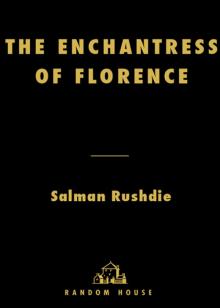 The Enchantress of Florence
The Enchantress of Florence Imaginary Homelands: Essays and Criticism 1981-1991
Imaginary Homelands: Essays and Criticism 1981-1991 Joseph Anton: A Memoir
Joseph Anton: A Memoir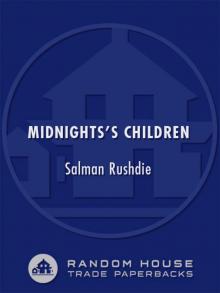 Midnight's Children
Midnight's Children East, West: Stories
East, West: Stories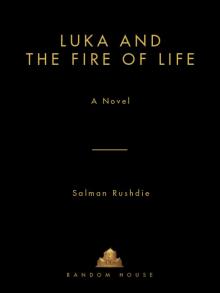 Luka and the Fire of Life
Luka and the Fire of Life Fury Fury Fury
Fury Fury Fury Haroun and the Sea of Stories
Haroun and the Sea of Stories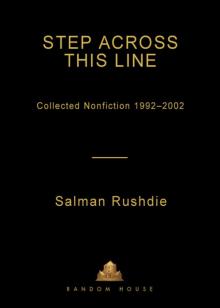 Step Across This Line: Collected Nonfiction 1992-2002
Step Across This Line: Collected Nonfiction 1992-2002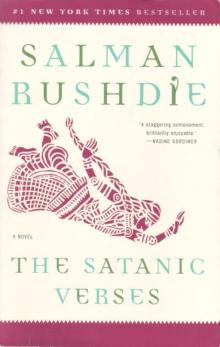 The Satanic Verses
The Satanic Verses The Moor's Last Sigh
The Moor's Last Sigh The Prophet's Hair
The Prophet's Hair The Ground Beneath Her Feet
The Ground Beneath Her Feet Two Years Eight Months and Twenty-Eight Nights
Two Years Eight Months and Twenty-Eight Nights Shalimar the Clown
Shalimar the Clown Grimus
Grimus The Duniazát
The Duniazát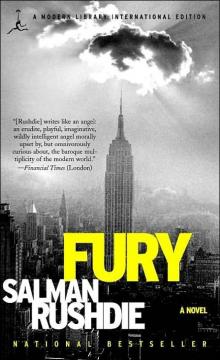 Fury
Fury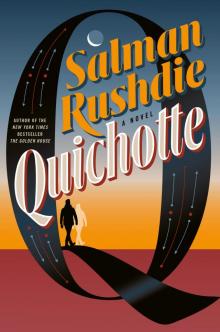 Quichotte
Quichotte The Jaguar Smile
The Jaguar Smile Joseph Anton
Joseph Anton Joseph Anton: A Memoir: A Memoir
Joseph Anton: A Memoir: A Memoir Imaginary Homelands
Imaginary Homelands The Satanic Verses: A Novel
The Satanic Verses: A Novel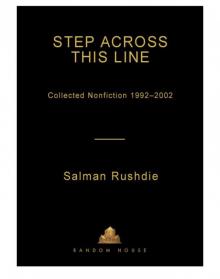 Step Across This Line
Step Across This Line East, West
East, West